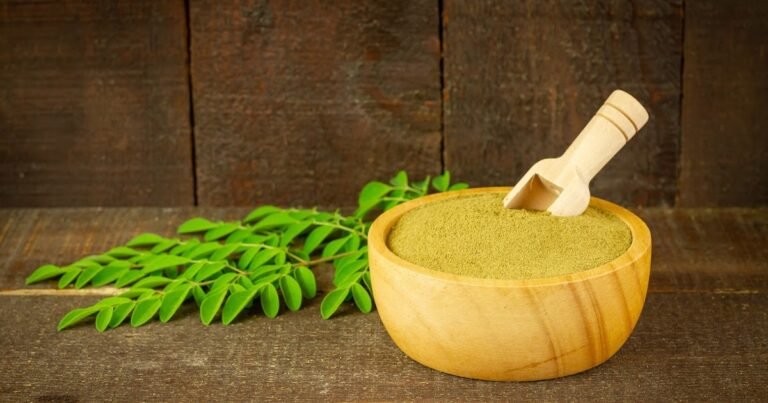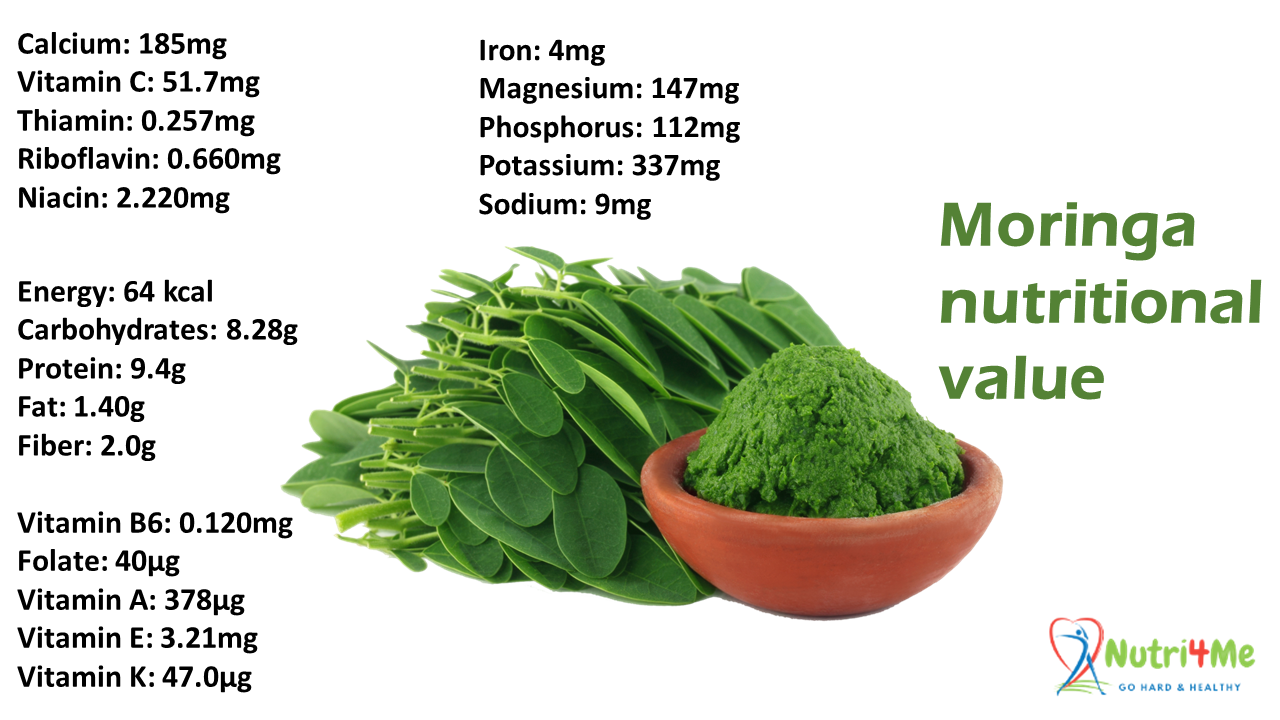Moringa is a nutrient-rich superfood that has been used for centuries in traditional medicine. Also known as the “miracle tree” or “drum tree”, Moringa is rich in vitamins, minerals and antioxidants, making it a powerful source of nutrition.
Moringa : Origin of the plant
Moringa is native to the sub-Himalayan regions of India, Pakistan, Bangladesh, and Afghanistan, but is also cultivated in many other parts of the world, including Africa, Asia, and South America.
It has been used for centuries in traditional medicine in these regions and its leaves, seeds and roots are known for their many health benefits, the plant is known by many names such as ‘miracle tree’, ‘drumstick’ and “horseradish tree”.
Today, Moringa is becoming increasingly popular around the world as a superfood, and its nutritional value and health benefits are attracting the attention of scientists and health experts.
Nutritional value of Moringa
Moringa is a plant, rich in vitamins, minerals and antioxidants, which makes it a powerful nutrition center.
One hundred grams of Moringa leaves contain:
- Energy: 64 kcal
- Carbohydrates: 8.28 g
- Protein: 9.4 g
- Fat: 1.40 g
- Vegetable fibers: 2.0 g
- Calcium: 185 mg
- Iron: 4 mg
- Magnesium: 147 mg
- Phosphorus: 112 mg
- Potassium: 337 mg
- Sodium: 9 mg
- Vitamin C: 51.7 mg
- Thiamine: 0.257 mg
- Riboflavin: 0.660 mg
- Niacin: 2,220 mg
- Vitamin B6: 0.120 mg
- Folic acid: 40μg
- Vitamin A: 378μg
- Vitamin E: 3.21 mg
- Vitamin K: 47.0μg
Moringa leaves are a rich source of antioxidants, including flavonoids, polyphenols and ascorbic acid, these compounds help protect your cells from damage caused by free radicals, which can lead to chronic diseases such as cancer and heart deseases.
Besides being a rich source of vitamins and minerals, Moringa leaves are also a good source of protein.
Moringa is also an excellent source of fiber, with 100 grams of leaves containing 2 grams of fiber.
Overall, the nutritional value of Moringa is impressive. It is packed with vitamins, minerals and antioxidants, making it a superfood that can provide a wide range of health benefits.
Moringa and its health benefits
Here are some of the most impressive health benefits of Moringa:
Strengthens immunity: Moringa leaves are a rich source of vitamin C, which is known to boost immunity by stimulating the production of white blood cells.
Promotes digestive system health: The fiber in Moringa leaves helps promote good digestive health by supporting the growth of healthy gut bacteria and preventing constipation.
Supports bone health: Moringa is a rich source of calcium, magnesium and phosphorus, which are essential minerals for maintaining strong and healthy bones.
Regulates blood sugar: Moringa has been shown to have a positive effect on blood sugar levels, making it a useful food for people with diabetes or those at risk of developing the condition.
Reduces inflammation: The antioxidants and anti-inflammatory compounds in Moringa leaves can help reduce inflammation throughout the body.
Improves skin health: Moringa leaves are a rich source of vitamin E, which is essential for maintaining healthy skin.
Improves brain function: Moringa leaves contain compounds that have been shown to boost brain function and improve memory. These compounds may also have a protective effect against conditions such as Alzheimer’s disease and other forms of dementia.
Overall, the health benefits of Moringa are impressive and wide-ranging. Whether you want to boost your immune system, support your bone health, or improve your brain function, incorporating Moringa into your diet can be a smart and healthy choice.
How to choose and store Moringa
When choosing Moringa, look for fresh, bright green leaves that are firm and not wilted, you can often find fresh Moringa at your local farmer’s market or you can buy it online in powder or capsule form.
If you buy fresh Moringa, it is best to use it within a few days as the leaves can wilt quickly.
To store fresh Moringa, wrap it in a damp paper towel and place it in an airtight container in the refrigerator.
If using Moringa powder, make sure you choose a reputable brand that uses organic, non-GMO sources. Store the powder in an airtight container in a cool, dry place away from direct sunlight.
How to cook with Moringa
Moringa leaves have a slightly bitter taste, similar to spinach.
Here are some ways to include Moringa in your diet:
Smoothies: Add a scoop of Moringa powder to your favorite smoothie recipe for a nutrient boost.
Soups and stews: Add chopped Moringa leaves to your favorite soup or stew recipe for added nutrition.
stir-fries: Add Moringa leaves to potatoes for an extra dose of vitamins and minerals.
Salads: Mix chopped Moringa leaves into your favorite salad for added nutrition.
Tea: Brew fresh Moringa leaves in hot water to make a tasty and nutritious tea.
In conclusion, Moringa is a superfood that is packed with an impressive array of nutrients and health benefits.
From boosting immunity to supporting bone health, and from reducing inflammation to improving brain function, Moringa’s benefits are numerous and far-reaching.
So why not try incorporating Moringa into your diet today?
Whether you choose to consume it in tea form, capsules, or as a tasty addition to your meals, Moringa is a versatile and nutritious food that can help support your overall health and well-being.
So why wait? Try Moringa and experience its amazing benefits for yourself!

